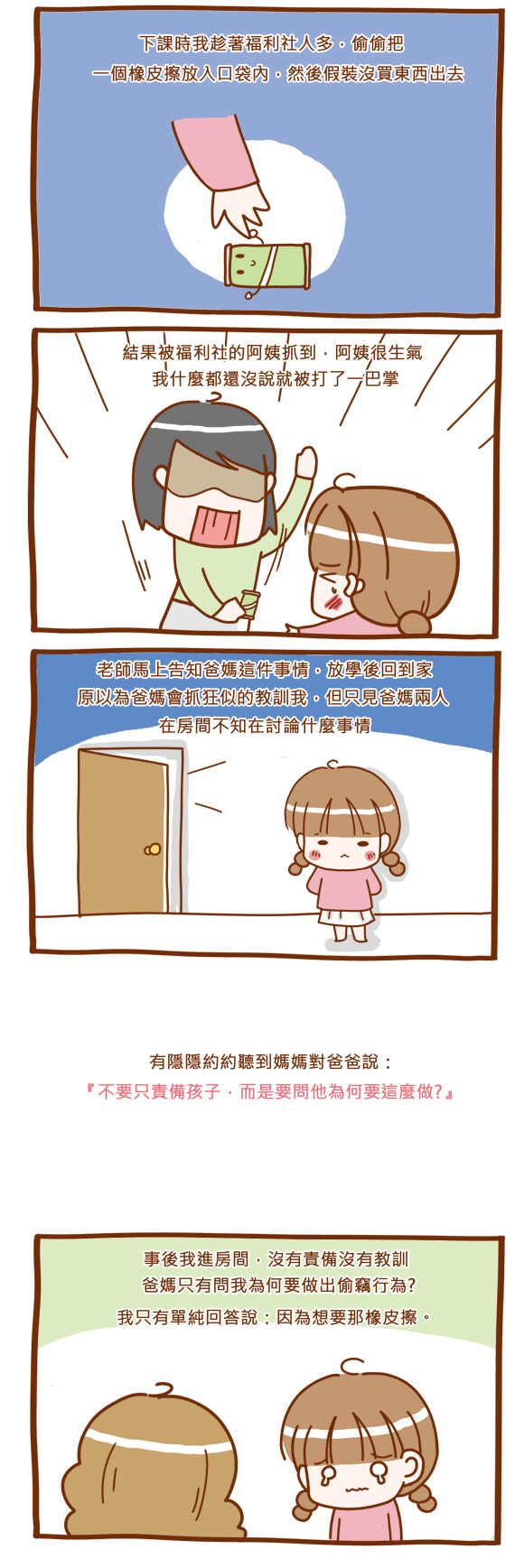★體罰,不是遷怒

反問我說,既然想要為何不跟爸媽拿錢? 要用偷的?
小孩子的思想很簡單,一時這樣問也回答不出來,我才知道原來也有這個方法,也可以得到橡皮擦
之後爸媽一起告知今天我做錯事了,要好好反省
我也知道錯了,學到做了虧心事的那種罪惡感,好沉重…..
小孩子就是這樣,想法很直接、很簡單
現在長大了再回頭看看我爸媽的教育,不知道如果他們當時是用強硬式的態度懲處我
我能不能理解反省的作用,或許爸媽是給我一次機會,但之後我真的就沒再犯了
至於打我一巴掌的福利社阿姨,現在想想他有甚麼資格打我一巴掌?
不是說不提倡體罰這事,但甚麼話都不說就直接打孩子這是體罰嗎?
這不是體罰,這是遷怒
體罰是懲罰孩子之前,先跟孩子講道理
讓孩子認同自己錯誤,再拿起你的愛的小手來懲處
甚麼話也不說,就直接動手打小孩
這是遷怒,你只是把怒氣放在孩子身上罷了
人家都說你是怎麼教孩子的,到時孩子也會這樣教導她的孩子
希望以後我也能用這樣的態度,要體罰但不是遷怒,來好好教導小泡菜長大成人
這篇文章獻給為人父母的你

這是『遷怒不是體罰』不是我創出來的,是某次在網路上看到一篇文章
覺得很有道理又在套入自己小時的經驗,才完成這篇文章
此篇為原FB粉絲團改編文,因為受到歡迎所以改編為圖文文章
此為FB粉絲團原文

今天終於把部落格版面更新完成了!

其實我本來想一個月內慢慢完成的,但霖一直在叫說原本的施工版面超醜
叫我一直趕快更新,太醜了他看不下去
這次的版面是先設計CSS在畫版圖,原本想說畫之前讀者選出來的版圖
但是發現好像跟這次的版面不搭…所以就先放棄了Q口Q
CSS真的好難懂呀!! 這是我的極限了…..

讀者Amelia的大頭貼,請來領取喔~

★ 6月。一堆雜事 的幸運讀者是82樓的k186738
請到留言板貼一張個人的大頭照給我,我會幫你繪製一張大頭貼
小時候我還是有被我爸媽打過啦,印象最深的是關廁所XDD
我想我爸媽對於教育應該是就事論事吧,不得不否認小孩子有時真的很白目…
這篇也會再抽出一名讀者喔





2.因為人體之生殖器官裏,總有備留精液;就類似像﹝汽、機﹞車一樣,
當車子開到快沒油時,總會有尚存留一公里左右之汽油,不至於說沒油的
時候,一滴都不剩。
3.除非有一種可能是否有異常。 ,當其用完最後一精液時,就會冒出一
顆上面寫著‘完了’的珠子。其實精液本來就是用血液製造的 妳精液用完
了,血還來不及製造精液…你在射他當然只好吐血 LOOK
恩恩
讚+1
要先了解一下原因再罵
WUTH WITH BY CEO(NOT CHEAT)
到今天為止 背太多東西受不了了
and swear out oaths to the new king or queen. The Demise of the
Crown Act 1901 in the UK, and similar legislation throughout the
other Commonwealth Realms, now makes this process unnecessary –
they are all employees of the Crown, rather than any particular
Sovereign.
Coronation of the new monarch usually occurs within 18 months
but is not necessary to secure the succession.
[edit] References
1. ^
http://www.parliament.the-stationery-office.co.uk/pa/ld/ldcomp/ctso05.htm
[edit] Bibliography
* Debrett's
Retrieved from "http://en.wikipedia.org/wiki/Demise_of_the_Crown"
Categories: Monarchy in Canada | Monarchy in Australia |
Monarchy in New Zealand | British monarchy | Commonwealth realms
| British laws | Canadian law | Government of the United Kingdom
In the UK, under the Representation of the People Act 1985, if
the demise of the Crown occurs during a general election, the
vote is postponed by fourteen days.
At the first meeting of Parliament under a new monarch there is
no speech from the Throne. All Members of Parliament and members
of the House of Lords take an oath of allegiance to the new
Sovereign. The House votes an Address to the Crown in response
to the official notification of the previous monarch's demise,
expressing condolences upon the death of the previous monarch
and loyalty to his or her successor.
All civil service and Crown offices also, traditionally, became
vacant upon the demise of the Crown. As all staff were employees
of the monarch, their employment would end upon the death of the
monarch thus all civil servants would have to be rehired
monarch's successor. This meeting is to arrange for the
formalities; neither the identity of the next monarch nor their
accession to the throne depends on it. The proclamation takes
place at St James's Palace, at Charing Cross, within the City
Boundary at Temple Bar, and at the Royal Exchange. In Canada the
Queen's Privy Council for Canada meets in Ottawa to perform the
same functions.
Traditionally, the demise of the Crown resulted in the immediate
dissolution of Parliament. This requirement was abolished
throughout the British Empire by the Representation of the
People Act 1867. A demise of the Crown no longer brings a
session or a Parliament to an end. The Succession to the Crown
Act 1707 provides that in the event of the demise of the Crown,
Parliament, if adjourned or prorogued, must meet as soon as
possible and if sitting must immediately proceed to act without
any summons in the usual form.[1]
The term was coined in English law to signify the immediate
transfer of sovereignty and royal prerogatives to the late king
or queen's successor without interregnum. By confusion, "demise"
is sometimes interpreted as referring to the death of the
Sovereign rather than to the transfer of the Crown. This
erroneous meaning is undermined by the principle in
constitutional law of the continuity of the monarchy, as
expressed in the maxim: "the Crown never dies".
[edit] United Kingdom
Upon the Crown's demise, in the United Kingdom, a meeting of the
Accession Council is held in London in order to give directions
for the proclamation of the late
Demise of the Crown
From Wikipedia, the free encyclopedia
Jump to: navigation, search
In relation to the shared monarchy of the Commonwealth realms
and other monarchies, the demise of the Crown is the legal term
for the end of a reign by a king, queen, or emperor, whether by
death or abdication.
新版面好可愛喔 XD
給你一個讚